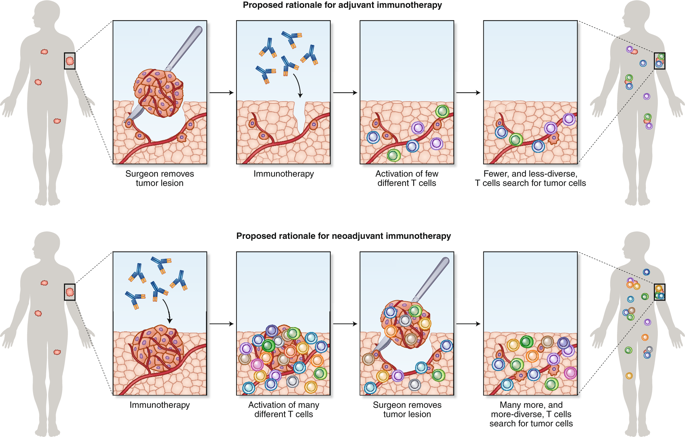Nature Medicine ( IF 58.7 ) Pub Date : 2020-04-09 , DOI: 10.1038/s41591-020-0829-0 Judith M Versluis 1, 2 , Georgina V Long 3, 4 , Christian U Blank 1, 2

|
Neoadjuvant checkpoint inhibition, in which the therapy is administered before surgery, is a promising new approach to managing bulky but resectable melanoma, and is also being explored in other cancers. This strategy has a high pathologic response rate, which correlates with survival outcomes. The fact that biopsies are routinely available provides a unique opportunity for understanding the responses to therapy and carrying out reverse translation in which these data are used to select therapies in the clinic or in trials that are more likely to improve patient outcomes. In this Perspective, we discuss the rationale for neoadjuvant immunotherapy in resectable solid tumors based on preclinical and human translational data, summarize the results of recent clinical trials and ongoing research, and focus on future directions for enhancing reverse translation.
中文翻译:

从新辅助检查站封锁的临床试验中学习。
新辅助检查点抑制是在手术前进行治疗的一种有前景的新方法,该方法可用于治疗体积庞大但可切除的黑色素瘤,并且在其他癌症中也正在探索中。该策略具有较高的病理反应率,这与生存结果相关。通常可以使用活检的事实为理解治疗反应和进行反向翻译提供了独特的机会,在这些情况下,这些数据可用于在临床或试验中选择更有可能改善患者预后的治疗方法。在此观点中,我们根据临床前和人类转化数据讨论了可切除实体瘤中新辅助免疫治疗的原理,总结了近期临床试验和正在进行的研究的结果,




















































 京公网安备 11010802027423号
京公网安备 11010802027423号